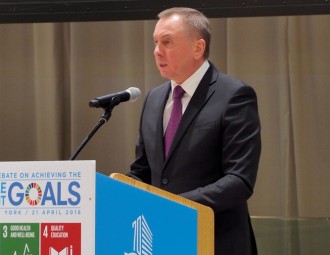Belarus Foreign Minister Uladzimir Makei took part in the high-level Session of UN General Assembly

This is the first event since the launch at the 2015 UN Summit of the 2030 sustainable development agenda dedicated to practical measures of their achievement.
The Minister of Foreign Affairs of the Republic of Belarus Uladzimir Makei participated in the high-level debate of the UN General Assembly on achieving sustainable development goals, the press service of the Belarusian Foreign Ministry informs.
In his statement at the meeting, the Head of the Belarusian Foreign Ministry proposed several principles of organising joint work in the UN to implement sustainable development goals.
In particular, Uladzimir Makei stressed the need for the full involvement and coordinated use of all the available international resources in order to assist countries in their development, including through expert advice, financial support, transfer of technologies. In addition, the Minister underlined the importance of a systematic approach to manage the assistance to middle-income countries, representing more than half of the UN member states. Belarus believes that necessary steps are required to create conditions for inclusive, interested and mutually beneficial participation of this and other groups of countries in the development process and in obtaining international assistance.
Uladzimir Makei also informed the participants of the meeting about ongoing work in Belarus to comprehensively approach the implementation of global sustainable development goals.
-
03.01
-
07.10
-
22.09
-
17.08
-
12.08
-
30.09








































